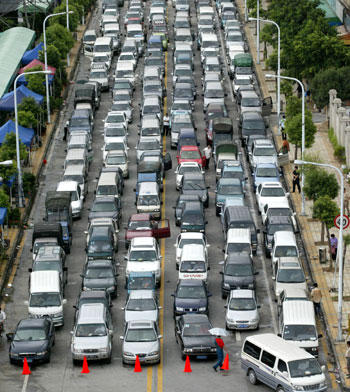Yeah, this is Going to Work
Prime Minister Wen Jiabao
responded Wednesday to growing public anxiety about inflation by
announcing that China would freeze energy prices in the near term, even
as international crude oil futures have continued to surge....Last November, China raised gasoline and diesel prices by almost 10
percent, partly to appease officials at state-owned refineries.
Refiners had complained that price controls were forcing them to
swallow the difference between higher prices for crude oil on the world
market and regulated consumer prices at home for refined products. So
refineries cut back production of gasoline and particularly diesel,
causing long lines at fuel stations around the country.
More on past Chinese problems from gas price caps. Here is a picture of one such past gas line in China.
I got my driver's license in 1978, just in time to spend the first few months of my driving life sitting in gas lines with the family car, a result of a series of market distorting actions by the US government.
Meanwhile, I presume the French and Germans will see no problem with this approach:
The Economist says,
of the state of economics education in France and Germany, "I
desperately hope it's not really this bad." Unfortunately, I think it's
really that bad. When the 35 hour work week was proposed, I was talking
to someone in the French consulate who did economics and trade. "Aren't
you worried that this will raise employer's costs and lead to business
failures or higher unemployment?" I asked."That's just Anglo-saxon economics" was his rather stunning reply. Apparently, in France, demand curves do not slope downwards.

It's worse than McArdle persumes, because most germans are not even ignorant to economic mechanisms, but they also get taught in public schools that those mechanisms don't work or don't apply.
Also, there are no economics courses in high school, the best I had was "Gemeinschaftskunde", means something like social and social class education. In these classes the imperative of the superiority of Keynesianism against free market (deemed American Style economics) is still common sense. It is taught that prices can be regulated and set though the actor in setting prices changes between a depression (government) and a haute (entrepreneur).
It's unsettling to see that ignorance is bliss and given that Gymnasium (high school plus first two years of college) is the highest form of non-University education in Germany, this is even tragic.
Perhaps education might be partly responsible for the high turnout of socialist economic policy not only in the government, but also in the mind of the people.
I'm reminded of Robert Heinlein's definition of a liberal as someone who accepts that water runs downhill, but prays to God it'll never reach bottom.
M
I tell you how bad economic education is, here in Germany:
All the negative impact, China's price regulations will have, will be regarded as the "shady side of Capitalism" in German press. Wait and see...
I can only imagine the adverse selection effect this must have on Germany and France. If you accept your status quo place in either or management or labor things are ok and you fit into your role. But if you are creative or an entrepreneur it seems your best bet is to go somewhere else, like London. Curious if any Europeans can weigh in on this question?
Yes,economic education of any worth does not exist in Germany. Politicians love to talk about "Marktversagen" (failure of market) when their attempts to regulate someting have unintended consequences. And they never have to wait long for calls to 'correct' those 'failing' markets!
Yes,economic education of any worth does not exist in Germany. Politicians love to talk about "Marktversagen" (failure of market) when their attempts to regulate someting have unintended consequences. And they never have to wait long for calls to 'correct' those 'failing' markets!